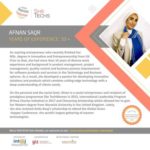Impact Stories from Economic Impact Policy Area

Fellows launch training program for girls with UNICEF and UN
Fellow(s): Nazira Sheraly, Aiturgan Zulpukarova, Elena Chigibaeva, Gulzire Minbaeva
Country: Kyrgyzstan
Cohort: 2016, 2017, 2018
Policy Area(s): Economic Impact, Education Diplomacy/Mentoring, Empowering Women and Girls, Entrepreneurship, Professional Growth, Youth Engagement
2016 fellow Nazira Sheraly, 2017 fellow Aiturgan Zulpukarova and 2018 fellows Elena Chigibaeva and Gulzire Minbaeva have launched a new project for girls through Techaim, their initiative that provides mentorship to women and girls to grow and develop their STEM skills and expand their knowledge in business, leadership and more. Their new project, TechKyzdar, was launched with support from UNICEF Kyrgyzstan as well as the UN Peacebuilding Fund.
TechKyzdar, which officially began this week, is working with 220 girls aged 14-18 from 11 communities, teaching them about digital skills, social entrepreneurship, leadership and more. They also plan to work alongside Technovation Kyrgyzstan, encouraging the girls to apply their skills to creating innovative solutions to issues in their communities. Soon, the fellows will bring in mentors and guest speakers who will support the participants with their goals and inspire them to continue their educational journeys.
Report Date...: 1/25/21

Fellow shares expertise on hiring at HR Forum 2021
Fellow(s): Haneen Abu Farha
Country: Palestinian Territories
Cohort: 2015
Policy Area(s): Economic Impact, Professional Growth
2015 fellow Haneen Abu Farha was a featured speaker at this month’s HR Forum 2021, a conference that convened HR professionals throughout the MENA region to share knowledge and discuss tools for businesses to thrive during the COVID-19 pandemic. Haneen is a technical recruiter for Upwork as well as a diversity sourcer for Yardstick Management.
Haneen’s talk was attended by a company founders, startup incubators and HR professionals throughout MENA. During her session, she spoke about current struggles within the industry, how to improve HR’s role within companies and how hiring has changed during the pandemic. “Business needs have changed, and now the market is getting back into demand with a focus on transferable skills. Tech talent markets are booming,” she said. Haneen is also a frequent contributor to Medium, writing articles on job hunting, personal development and more. In a recent piece, she wrote about landing a job during a pandemic, sharing about the future of remote work as well as emerging job trends.
Report Date...: 1/18/21

Fellow shares career advice in Instagram Live
Fellow(s): Azhar Mambetova
Country: Kyrgyzstan
Cohort: 2019
Policy Area(s): Economic Impact, Education Diplomacy/Mentoring, Professional Growth
This week, 2019 fellow Azhar Mambetova was interviewed by 2018 fellow Elena Chigibaeva, speaking about her career journey and sharing best practices for entering a digital career. The interview was hosted by Techaim, the TechWomen fellow-led initiative that provides mentorship to women and girls to grow and develop their STEM skills and expand their knowledge in business, leadership and project management. Techaim was a recipient of a 2019 Alumni Engagement Innovation Fund grant.
Azhar is the managing director of digital business and distant banking services for Kompanion Bank. She is also currently pursuing an MBA at Central European University. During the interview, hosted on Techaim’s Instagram page, Azhar spoke about her role overseeing Kompanion’s digital transformation and creating digital finance services for Kyrgyzstan’s population. She also answered audience questions, giving advice on pursuing a digital profession and sharing about the lessons she has learned throughout her career.
Report Date...: 1/11/21

Four TechWomen alumnae projects win AEIF grant
Fellow(s): Dalia Shurrab, Yamama Shaka’a, Ruba Awayes, Christelle Tayou, Gisele Beatrice Sonfack
Country: Cameroon, Palestinian Territories
Cohort: 2014, 2016, 2017, 2019
Policy Area(s): Economic Impact, Education Diplomacy/Mentoring, Empowering Women and Girls, Entrepreneurship, Professional Growth, Youth Engagement
Recently, it was announced that four TechWomen alumnae initiatives were named winners of the 2020 Alumni Engagement Innovation Fund. The 2020 theme of “Women, Peace, and Security” received over 300 submissions; 80 teams of exchange alumni from 67 countries were awarded funding for their community-based projects.
Through Mompreneur, 2019 fellow Dalia Shurrab will help support 60 mothers from the Gaza Strip and 30 from the West Bank to start their own online businesses. With specialized training in design and marketing, the program will empower women to monetize their skills in wood carving, embroidery, cooking and more. The project including Palestinian Territories alumnae Yamama Shaka’a (2016) and Ruba Awayes (2017), VTech Road, was recently adapted to a virtual setting due to the COVID-19 pandemic. The comprehensive online learning platform will offer courses and educational materials that support women’s political, economic and civic participation. 2014 fellow of Cameroon Christelle Tayou and her team created Protecting Internally Displaced Women from Abusive Arrests to address the needs of displaced and vulnerable women, many who lack proper documentation, through legal support and health assistance. They will also train women and girls in the monitoring and reporting of human rights violations. With Combatting Sexual Violence Against Female Students and Female Teachers in Secondary Schools in the Littoral Region of Cameroon, 2016 fellow Gisele Beatrice Sonfack will address Gender-Based Violence, targeting eight schools and working with students to raise awareness and create meaningful community impact.
Report Date...: 1/4/21

Fellow leads mentorship initiative for indigenous women
Fellow(s): Noella Nibakuze
Country: Rwanda
Cohort: 2019
Policy Area(s): Economic Impact, Education Diplomacy/Mentoring, Empowering Women and Girls, Entrepreneurship, Environmental Sustainability, Professional Growth
2019 fellow Noella Nibakuze has completed leading a two-month project that mentored 10 young Rwandan women artists in sustainable architecture. Noella is a design associate at MASS Design Group, a U.S.-based architecture firm that leads purpose-driven projects, focuses on using sustainable materials and promotes local economies.
MASS recently partnered with the Soul of Nations Foundation, an organization that uplifts indigenous people through their programming centered on art, research and scholarship. The project also included the U.S. Embassy Rwanda, as well as the Institute of National Museums. Noella was appointed by MASS to lead the effort, titled “Indigenous International: Green Architecture Project,” helping mentor the 10 Rwandan women artists through job shadowing, workshops and more. The completion of the project was celebrated at a virtual event, where U.S. Ambassador to Rwanda Peter Vrooman thanked Noella for her mentorship.
Report Date...: 1/4/21

TechWomen/TechGirls Clubs host regional summits
Fellow(s): TechWomen/TechGirls Clubs
Country: Algeria, Egypt, Jordan, Kazakhstan, Kyrgyzstan, Lebanon, Morocco, Palestinian Territories, Tajikistan, Tunisia, Uzbekistan
Policy Area(s): Economic Impact, Education Diplomacy/Mentoring, Empowering Women and Girls, Professional Growth, Youth Engagement
This month, TechWomen/TechGirls Clubs held their biannual regional summits for the CSA and MENA regions, convening alumnae from both programs to share club updates, network and reignite club involvement for the coming year. TechWomen/TechGirls Clubs provide a space for career counseling, mentoring, leadership development and more. Launched in 2018, the cross-program clubs expanded from seven program countries in MENA to now include four countries in CSA.
After IIE and Legacy International shared program updates, summit participants were encouraged to provide updates about their club and activities, sharing about their progress despite a challenging year. Although the COVID-19 pandemic halted or delayed many outreach activities, workshops and initiatives, the clubs continue to organize, plan and provide mentorship opportunities to the TechGirls participants. In breakout rooms, club teams came together to discuss leadership structure, share what practices have created successful events and decide how the club will move forward in the coming year. After returning to the main room, teams shared out the highlights of their breakout room discussions. In a closing activity, TechWomen and TechGirls alumnae were prompted to type into the chat box what inspires them the most as a member of the TechGirls and TechWomen community. “We are so inspired by each of your efforts and work despite the challenging year,” said the TechGirls team.

Fellows host second annual TechWomen Nigeria Conference
Fellow(s): Hannah Kabir, Busayo Durojaiye, Joy Agene, Ogechi Onuoha, Ogo Maduewesi, Azizat Gbadegesin, Oluremi Hamid, Carolyn Seaman, Hannatu Onogu
Country: Nigeria
Cohort: 2013, 2014, 2016, 2017, 2018
Policy Area(s): Economic Impact, Empowering Women and Girls, Entrepreneurship, Environmental Sustainability, Professional Growth
Last week, TechWomen fellows from multiple cohorts came together to host the second annual TechWomen Nigeria Conference, convening women in technology throughout Nigeria for a one-day virtual event. Fellows Hannah Kabir (2013), Busayo Durojaiye (2014), Joy Agene (2014), Ogechi Onuoha (2014), Ogo Maduewesi (2014), Azizat Gbadegesin (2016), Oluremi Hamid (2016), Carolyn Seaman (2017) and Hannatu Onogu (2018) collaborated to deliver this year’s event themed on technology for economic and emotional well-being. TechWomen Director Katie Zee delivered opening remarks, highlighting the impact Nigerian fellows have created in their communities and beyond.
“We have selected this theme in sensitivity to the events of the year 2020, to be able to engage on key topics such as Artificial Intelligence, healthcare, automation, education and more,” said Busayo. The conference was co-sponsored by Global Tea Party, the event series founded by TechWomen mentor Dr. Jeannice Samani, who also delivered the opening keynote, “The Next Big Wave: Transformation of the Tech Economy.” Jeannice served as a Facilitator for the TechWomen 2020-2021 Professional Interest Groups, and invited Emerging Leader Flora Asibe to participate; Flora, an agricultural researcher, moderated a breakout room that discussed using technology for food security and wellness. After a series of opening talks, attendees were split into breakout sessions moderated by fellows and local tech leaders to discuss new tech trends, Artificial Intelligence and how to boost well-being in a remote work environment.
Report Date...: 12/21/20

Fellows featured in female role model campaign
Fellow(s): Shatha Jayyousi, Afnan Saqr, Rania Bader, Diana Nassar
Country: Jordan
Cohort: 2013, 2015, 2016
Policy Area(s): Economic Impact, Empowering Women and Girls, Entrepreneurship, Professional Growth
Fellows of Jordan Shatha Jayyousi (2013), Afnan Saqr (2015), Rania Bader (2016) and Diana Nassar (2016) were featured in a social media campaign that amplified 17 leading women in IT who serve as role models and inspire future generations of women in technology. The campaign, SHETECHS Role Models, was created by Intaj, the Information and Communications Technology Association of Jordan.
The new SHETECHS platform hopes to encourage dialogue about women’s contributions to IT, as well as provide a space for women in IT to network and share ideas. With 20 years of experience, Shatha was highlighted for her extensive experience empowering women in tech. Afnan, who recently completed a Chevening Scholarship in the UK, was featured for her commitment to social entrepreneurship and achievements in product management. Rania was amplified for her career at Orange Jordan as well as her passion for combining well-being and mental health issues with technology. Diana, who recently completed her MBA at Stanford University, was featured for her work in product management and her advocacy for women in technology.
Report Date...: 12/21/20

Fellow shares expertise at summit for women in science
Fellow(s): Hadeel Hosney
Country: Egypt
Cohort: 2019
Policy Area(s): Economic Impact, Professional Growth
This month, 2019 fellow Dr. Hadeel Hosney was a speaker at the She Talks Science Summit 2020, a virtual event that brought together women in science for three days of idea exchange and networking. Hadeel is an environmental lecturer and researcher as well as the technical coordinator for Zewail City of Science and Technology.
The summit was attended by undergraduate and postgraduate students as well as women in science from throughout the MENA region. In her presentation, Hadeel spoke about bioprocess engineering, a growing sector that involves the design and development of equipment and processes for the manufacturing of products like food, medicines, vaccines, biologically-based products and more. “I was asked what background is needed to be specialized in this,” said Hadeel. “My answer: no specialization is needed — you just need the passion to help your community.”
Report Date...: 12/21/20

Fellow mentors teams for UNDP hackathon against violence
Fellow(s): Natalya Tyudina
Country: Tajikistan
Cohort: 2018
Policy Area(s): Economic Impact, Education Diplomacy/Mentoring, Empowering Women and Girls, Professional Growth, Youth Engagement
2018 fellow Natalya Tyudina served as a mentor for this week’s #NoViolence hackathon in Tajikistan, guiding six teams through developing innovative solutions that support the country’s most vulnerable groups. The two-day hackathon was hosted by the United Nations Development Programme (UNDP) in Tajikistan in partnership with Ilmkhon Skills Accelerator, and aimed to empower young people throughout Tajikistan to address domestic violence as well as discrimination against women with HIV/AIDS.
The hackathon’s 10 teams were led by six mentors who were experts in public health, tech, human rights and more. During her sessions, Natalya, a cloud technology developer for Ericsson, worked alongside her six teams to develop a prototype that supported vulnerable women. “I was asking them, ‘What is your project about? How do you plan to implement it? What is your six-month plan?’” said Natalya. “I wanted to navigate them by asking a lot of questions and helping them improve their solution.” At the conclusion of the event, her teams created a safe app for women that calls the police and shows the nearest women’s shelters, a chatbot that answers questions and provides information the laws surrounding domestic violence and an app that tracks HIV test results and provides HIV-related health information. Her teams won first and third place, receiving a cash prize to support implementation of their project. “Everyone should feel supported and safe, no matter of social status, gender or health conditions,” said Natalya.
Report Date...: 12/14/20

